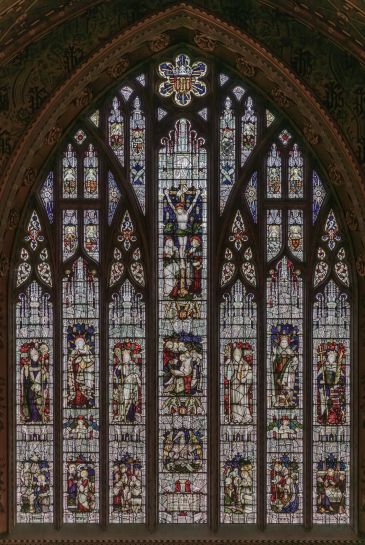Queens’ College Chapel, consecrated 1891 October 13, contains stained glass by two notable 19th century stained glass artists: Charles Eamer Kempe (east and north windows), and John Hardman & Co. (south windows).
This page provides documentation of the imagery in each window, and a short history. Each illustration can be enlarged by clicking on it: after that, your web browser might provide a second stage of enlargement: either by another click, or (for touch screens) by an un-pinch gesture. By this means, you should be able to view details of the imagery in the glass which are not clearly visible from ground level in the chapel itself. Hyperlinks in the documentation take you to fuller explanations of the meaning of each item.
East Window
The East Window was made in 1890–91 by Charles Eamer Kempe, in the stone tracery design of George Frederick Bodley, architect of the Chapel. The window incorporates a memorial to William Wright (1830–1889), Sir Thomas Adams’s Professor of Arabic 1870–, Fellow 1870–, given by his friends.
The imagery of the window includes a sequence of eight events in the life of Jesus, read chronologically as follows:
• left to right in the bottom three panels on the left;
• top downwards for two panels of the centre light;
• left to right in the bottom three panels on the right.
The seven panels of figures across the middle consist of:
• four Saints associated with the Parish, the Diocese, and the College;
• the Virgin & Child, and Christ in Majesty, raised slightly above the others;
• in the centre, the Entombment from the chronological sequence above.
The Pelican in her Piety was a favourite of Kempe’s, and the unusual spelling of “Ihesus” was a characteristic of his work.
In the tracery is a mixture of Christian symbols with emblems relevant to the history of the College. The full scheme is given in the table below (which, on small screens, can be scrolled sideways).
Manufacture of the East window commenced in 1890 [2000 p.22 CAM 7.1]. This and the Hardman windows on the south side were the only stained glass in the chapel at the time of its consecration.
North Windows
The five north windows are all by Charles Eamer Kempe, and were installed in the period 1892–1902. The overall theme of Windows 1 to 4 (numbered from the East End) is the early history of the church in England, to be read chronologically from the East End westwards (right to left). In all five windows, secondary lower images illustrate scenes from the Old Testament, arranged somewhat chronologically, although not strictly so.
It has been observed [private communication] that the choice of persons to illustrate in these windows is remarkably similar to those whose histories are recounted in Turning Points of English Church History, by Edward Lewes Cutts (1824–1901), published in 1874. Cutts had been an undergraduate at Queens’ College 1844–48, overlapping with William Magan Campion 1845–49, who was a significant force in determining the development of religious practice in the College during his time as a Fellow.
North Window 1
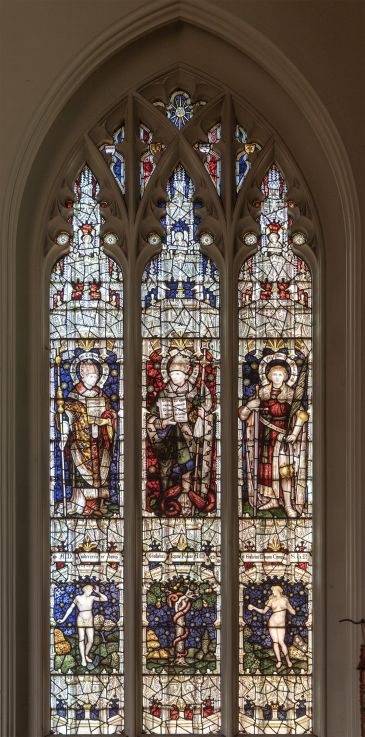 North Window 1 was the gift of:
North Window 1 was the gift of:
(a) William Lyme Fowke (1819–1896), matric. 1838, Vicar of Bisbrooke, Rutland, 1872–87; and
(b) William Magan Campion (1820–1896), matric. 1845, B.A. 1849, Fellow 1850–92, Tutor 1853–92, B.D. 1860, Rector of St Botolph’s 1862–92, D.D. 1870, Rural Dean 1870–92, Hon. Canon of Ely 1879–96, President from 1892.
| MDCCC XCII |
Charles E. Kempe |
George F. Bodley |
ATE monogram |
||
| “venite adoremus” | “Rex martyr̄ dom̄ ” | “venite adoremus” | |||
| St Augustine First Archbishop of Canterbury 597–604? holding a picture of the Crucifixion |
St Patrick (? 5th C) Archbishop holding an open book: “Te invocamus Te laudamus Te adoramus O Beata Trinitas” |
St Alban (? 3rd C) First English Martyr |
|||
| A.D. mdcccxcii ex donis | Gulielmi Lyme Fowke A.M. | et Gulielmi Magan Campion S.T.P. | |||
| Adam | Serpent in the Tree of Knowledge |
Eve | |||
| [Genesis 3] | |||||
In the tracery, this window contains the date 1892, the signature coats of arms of Kempe and of Bodley, and a rare example of the monogram of Alfred Edward Tombleson (1851–1943), master glass painter for Kempe.
This window was manufactured in 1892 [2000 p.23 CAM 7.6].
North Window 2
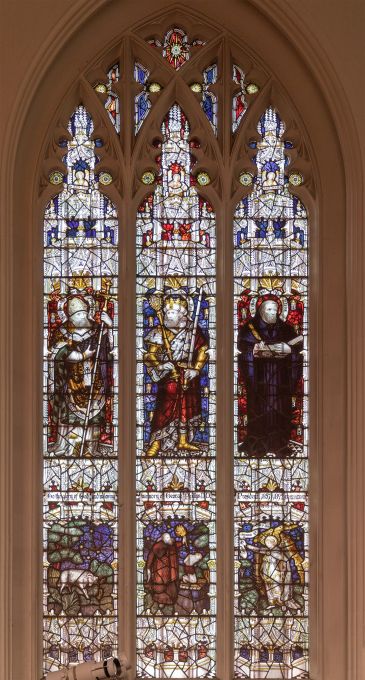 North Window 2 is a memorial to George Phillips (1804–1892), matric. 1826, B.A. 1829, Fellow 1831–46, B.D. 1839, Rector of Sandon, Essex 1846–57, President 1857–92. D.D. 1859.
North Window 2 is a memorial to George Phillips (1804–1892), matric. 1826, B.A. 1829, Fellow 1831–46, B.D. 1839, Rector of Sandon, Essex 1846–57, President 1857–92. D.D. 1859.
| “Laus Deo” | “Laus Deo” | “Laus Deo” |
| St Theodore (of Tarsus) (602–690). Archbishop of Canterbury 668–690. |
King Alfred (c.849–899). |
Venerable Bede (672/3–735). Scholar, author. |
| To the glory of God and in loving | memory of George Phillips D. D. | President. 1857–1892 |
| Ram caught in a thicket | Abraham, with knife and fire, about to sacrifice his son Isaac. |
An angel intervening: “Nunc cognovi ꝗd times Dm̄ ” |
| [Genesis 22:1–13] |
This window was manufactured in 1893 [2000 p.23 CAM 7.5].
North Window 3
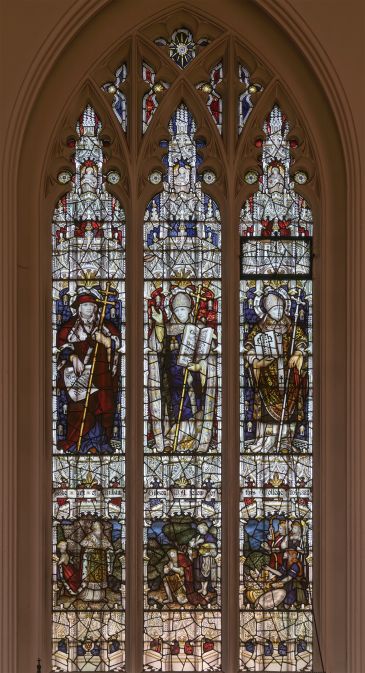 North Window 3 was the gift of William Gibson (1847–1917), matric. 1865, Fellow 1869–82 (non-resident), Solicitor 1872. Benefactor to the Chapel. Gibson specified that the inscriptions on his window should be in English, not Latin [The Dial, No. 30, 1917 Michaelmas, p. 4].
North Window 3 was the gift of William Gibson (1847–1917), matric. 1865, Fellow 1869–82 (non-resident), Solicitor 1872. Benefactor to the Chapel. Gibson specified that the inscriptions on his window should be in English, not Latin [The Dial, No. 30, 1917 Michaelmas, p. 4].
| “Laus Deo” | “Laus Deo” | “Laus Deo” |
| Stephen Langton (c.1150–1228) Cardinal Archbishop of Canterbury 1207–1228 holding Magna Charta |
Saint Anselm (1033/4–1109) Archbishop of Canterbury 1093–1109 holding his book Cur Deus Homo. |
Lanfranc (d. 1089) Archbishop of Canterbury 1070–1089 holding his design for the cathedral |
| The gift of William | Gibson M.A. fellow of | this College 1869–1882 |
| Melchizedek serving bread and wine to Abraham and his army |
Abraham | Abraham’s army with the spoils of victory. |
| [Genesis 14:18–20] |
The signature arms of Kempe (three wheatsheafs, or ‘garbs’) appear at the centre of the panel below Melchizedek, inscribed “Anno Domini mdcccxciv” (1894).
This window was manufactured in 1894 [2000 p.22 CAM 7.4].
North Window 4
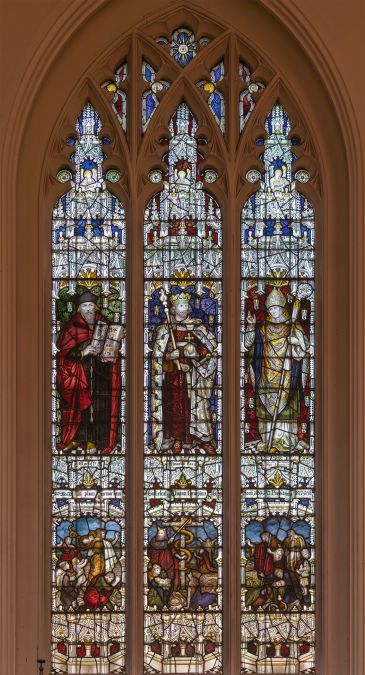 North Window 4 is a memorial to William Magan Campion (1820–1896), matric. 1845, B.A. 1849, Fellow 1850–92, Tutor 1853–92, B.D. 1860, Rector of St Botolph’s 1862–92, D.D. 1870, Rural Dean 1870–92, Hon. Canon of Ely 1879–96, President from 1892. He had been a benefactor to the Chapel and one of the co-donors for North Window 1.
North Window 4 is a memorial to William Magan Campion (1820–1896), matric. 1845, B.A. 1849, Fellow 1850–92, Tutor 1853–92, B.D. 1860, Rector of St Botolph’s 1862–92, D.D. 1870, Rural Dean 1870–92, Hon. Canon of Ely 1879–96, President from 1892. He had been a benefactor to the Chapel and one of the co-donors for North Window 1.
| “Alleluia” | “Alleluia” | “Alleluia” |
| John Wycliffe (c.1328–1384). Translator of the Bible into English. |
King Edward I (1239–1307). |
Robert Grosseteste (c.1168–1253). Bishop of Lincoln 1235–53. Scholar. |
| In piam memoriam | Gulielmi Magan Campion S.T.P. | Socii 1850–1892: Præsidentis 1892–1896 |
| Onlookers | Moses and the Brazen Serpent |
Onlookers |
| [Numbers 21:4–9] |
Moses is depicted with radiant horns.
This window was manufactured in 1897 [2000 p.22 CAM 7.3].
North Window 5
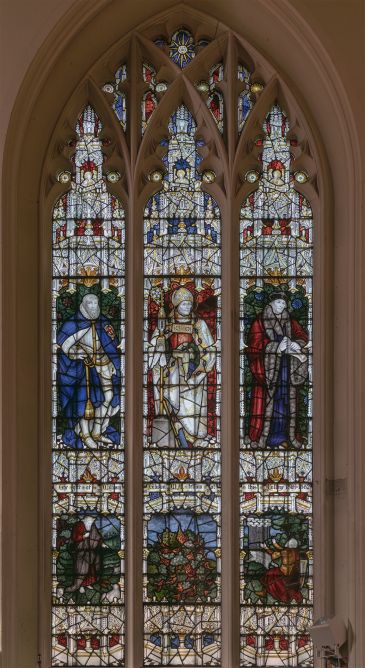 North Window 5 breaks away from the overall theme of windows 1 to 4, and portrays three people associated with the history of the college. As with window 3, this window is the gift of William Gibson, and donor the inscription is in English rather than Latin. There are no inscriptions to identify the three people portrayed.
North Window 5 breaks away from the overall theme of windows 1 to 4, and portrays three people associated with the history of the college. As with window 3, this window is the gift of William Gibson, and donor the inscription is in English rather than Latin. There are no inscriptions to identify the three people portrayed.
| “Laus Deo” | “Laus Deo” | “Laus Deo” |
| Sir Thomas Smith (1513–1577). Fellow 1530–47. |
John Fisher (1469–1535). President 1505–08. |
Erasmus (1466–1536). Visiting professor 1510–15. |
| The gift of William | Gibson M.A. fellow of | this College 1869–1882 |
| Moses tending sheep. |
The Burning Bush | Gideon and the Fleece. |
| [Exodus 3] | [Judges 6:36–40] | |
Sir Thomas Smith is depicted as Chancellor of the Order of the Garter, an office to which he was appointed in 1572. He was not a Companion member of the Order.
John Fisher is depicted with an execution block and axe.
Moses is depicted with radiant horns. He is barefoot: his shoes lie on the ground beside him.
This window was manufactured in 1902 [2000 p.22 CAM 7.2]. It was the last that Kempe made for Queens’. He signed it with a single wheatsheaf (garb), which is so well hidden that I shall leave it as an exercise for the viewer to find.
South Windows
The three South Windows closest to the East End are earlier stained glass transferred from the south windows of the Old Chapel. They were made in the period 1858–79 by Hardman of Birmingham (who also made all the stained glass in the Old Hall in the 1850s). Each light depicts a significant event in the life of Jesus, to be read chronologically from west to east (right to left).
South Window 1
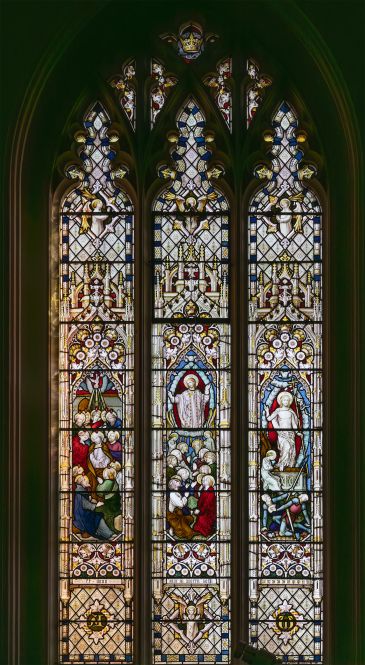 South Window 1 (the last of the chronological sequence) was given in 1879 by James Newton Goren (1819–94), matric. 1837, Fellow 1841–94 (non-resident), Barrister 1844.
South Window 1 (the last of the chronological sequence) was given in 1879 by James Newton Goren (1819–94), matric. 1837, Fellow 1841–94 (non-resident), Barrister 1844.
| Angel praying |
Angel praying |
Angel praying |
| Pentecost | Appearance to the Disciples |
Resurrection |
| — | — | — |
| ex dono | Iac N Goren socii | MDCCCLXXIX |
| Alpha | Angel in wonder |
Omega |
South Window 2
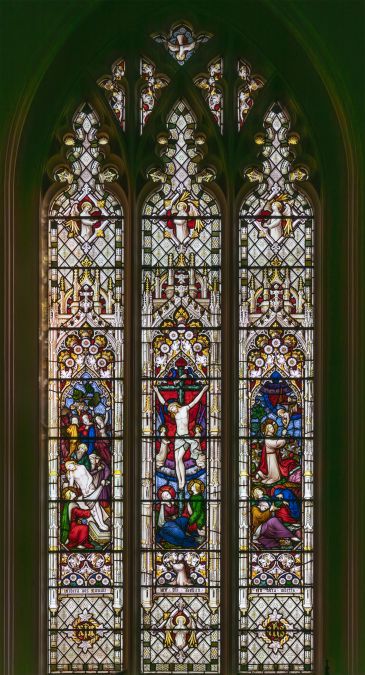 South Window 2 was a memorial to Joshua King (1798–1857), [matric. at Trinity 1815, migrated to Queens’ 1816, B.A. (Senior Wrangler) 1819, Fellow 1820–32, President 1832–57, LL.D. 1838, Lucasian Professor of Mathematics 1839–49], given by his widow Mary (1797–1885), in 1858. The figure of a man praying in the centre light is a representation of Joshua King.
South Window 2 was a memorial to Joshua King (1798–1857), [matric. at Trinity 1815, migrated to Queens’ 1816, B.A. (Senior Wrangler) 1819, Fellow 1820–32, President 1832–57, LL.D. 1838, Lucasian Professor of Mathematics 1839–49], given by his widow Mary (1797–1885), in 1858. The figure of a man praying in the centre light is a representation of Joshua King.
| Angel wringing hands |
Angel wringing hands |
Angel wringing hands |
| Entombment |
Crucifixion |
Agony in the Garden |
| — | Man praying | — |
| Libera nos Domine | In die Iudicii | In hora mortis |
| χρϲ | Angel sobbing |
ιης |
Records at the Hardman Archive [Tidy Order Book 1858–Aug 1861, f. 281, Sept.] confirm “Figure of Dr King in centre light” and the inscription. The quoted price was encoded as £EDY (£100). This window was ordered by the college at the same time as the four side windows of the Old Hall [f. 282].
South Window 3
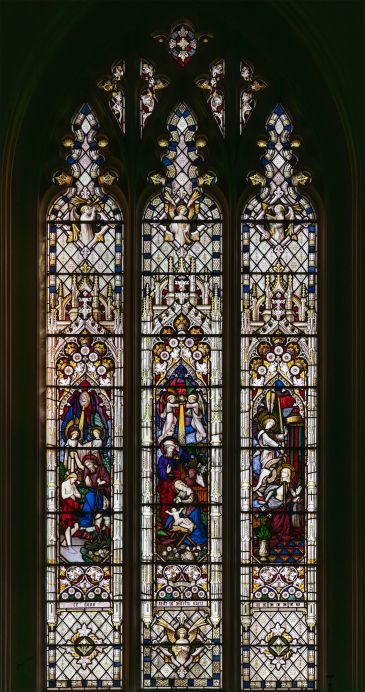 South Window 3 (the first of the chronological sequence) was given in 1860 by James Newton Goren (1819–94), matric. 1837, Fellow 1841–94 (non-resident), Barrister 1844.
South Window 3 (the first of the chronological sequence) was given in 1860 by James Newton Goren (1819–94), matric. 1837, Fellow 1841–94 (non-resident), Barrister 1844.
| Angel playing music |
Angel playing music |
Angel playing music |
| Baptism |
Nativity |
Annunciation |
| — | “Deo et Collegii” | — |
| ex dono | Iac N Goren socii | MDCCCLX |
| — | Angel playing music |
— |
This window was ordered by the college in January 1859 [Hardman Archives, Tidy Order Book 1858–Aug 1861, f. 316, 1859 January 20]. The quoted price was encoded as £EDY (£100).
South Window 4
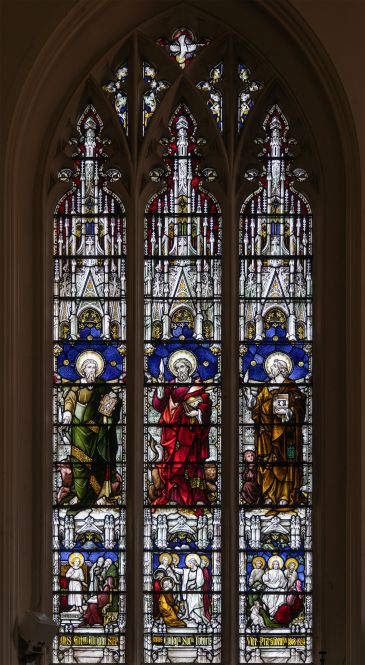 South Window 4 is a memorial to Arthur Wright (1843–1924), matric. 1863, B.A. 1867, Fellow 1867–1924 (non-resident until 1872), Dean 1872–82, Tutor 1878–98, Vice-President 1900–24, D.D. 1904.
South Window 4 is a memorial to Arthur Wright (1843–1924), matric. 1863, B.A. 1867, Fellow 1867–1924 (non-resident until 1872), Dean 1872–82, Tutor 1878–98, Vice-President 1900–24, D.D. 1904.
Arthur Wright had been the prime mover (and also the most generous subscriber) of the campaign for a new Chapel, after having been Dean 1872–82, and observing the overcrowding of the old chapel.
The stained glass for the memorial window was made by John Hardman & Co. Ltd, of Newhall Hill, Birmingham. The window was dedicated after Matins on Sunday, June 27, 1926, at the annual Club Weekend [The Dial, No. 54, 1926 Michaelmas, p. 9].
The window features the authors of the three synoptic gospels, the topic of most of Wright’s research and publications. The subsidiary images are scenes of Jesus’s teaching activity [Queens’ College 1925–26, p. 7; General Ledger p. 375].
| St Luke |
St Mark |
St Matthew |
| Young Jesus in the Temple |
The Great Commission |
Sermon on the Mount |
| M·S· Arturi Wright S·T·P | huius Collegii Socii Tutoris | Vice-Præsidentis 1868–1924 |
Links to related pages
- Chapel Exterior architecture and history
- Chapel Interior
- Chapel Organ
- Chapel Triptych
- Chapel War Memorial
- Monumental Brasses
- The Kempe Windows, by Adrian Barlow.
Sources, References, and Further Reading
1874: Turning Points of English Church History, by Edward Lewes Cutts (1824–1901). (OCLC 13195036)
1899: The Queens’ College of St Margaret and St Bernard in the University of Cambridge, by Joseph Henry Gray, pp. 291–2; (OCLC 8568413)
1926: New edition, updated, pp. 267–8. (OCLC 79562186)
2000: The Corpus of Kempe Stained Glass in the United Kingdom and Ireland, ed. Philip N. H. Collins (1942–), pp. 22–23. (ISBN 978-0-9513125-1-3)
2008: Hardman of Birmingham : Goldsmith and Glasspainter, by Michael John Fisher (1943–2021). (ISBN 978-1-84306-362-9)
2014: George Frederick Bodley and the Later Gothic Revival in Britain and America, by Michael Harold Webster Hall (1957–), pp. 324–5. (ISBN 978-0-300-20802-3)
2018: Kempe : the life, art and legacy of Charles Eamer Kempe, by Adrian Edward Barlow (1949–), pp. 98–99, 101. (ISBN 978-0-7188-9463-4)
2019: Espying heaven : the stained glass of Charles Eamer Kempe and his artists, by Adrian Edward Barlow (1949–), p. 105. (ISBN 978-0-7188-9464-1)
